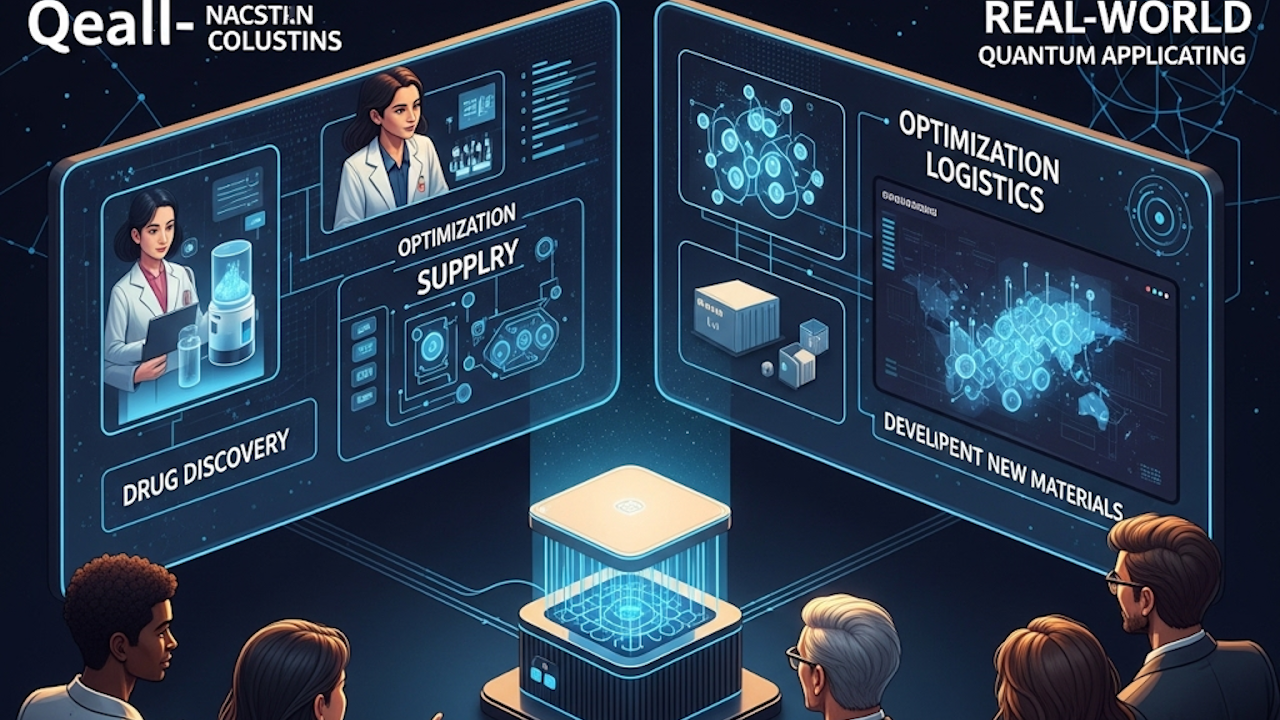Quantum computing is poised to revolutionize numerous fields by solving complex problems that are currently intractable for even the most powerful classical computers. Its unique ability to process vast amounts of data simultaneously, thanks to principles like superposition and entanglement, opens doors to unprecedented advancements across science, medicine, finance, and artificial intelligence.
Drug Discovery and Materials Science
One of the most promising applications of quantum computing lies in drug discovery and materials science. Traditional drug development is a long, expensive, and often unsuccessful process, heavily reliant on trial and error. Quantum computers can simulate molecular interactions with far greater accuracy than classical machines. This capability allows researchers to:
- Accelerate drug discovery: By precisely modeling how drug candidates bind to target proteins, quantum computers can identify the most effective compounds much faster, reducing the time and cost associated with bringing new medicines to market. This could lead to breakthroughs in treating diseases like cancer, Alzheimer’s, and Parkinson’s. 💊
- Design novel materials: Understanding the quantum mechanical properties of atoms and molecules is crucial for creating materials with specific desired characteristics. Quantum simulations can help design new superconductors, more efficient solar cells, lightweight alloys for aerospace, and advanced catalysts for industrial processes, leading to significant technological and environmental benefits. 🧪
Financial Modeling and Optimization
The financial sector stands to gain significantly from quantum computing’s ability to handle complex optimization problems and process large datasets. Key applications include:
- Risk assessment and fraud detection: Quantum algorithms can analyze vast quantities of financial data to identify subtle patterns indicative of market fluctuations, credit risk, or fraudulent activities with greater speed and accuracy than current methods. This could lead to more stable financial systems and better protection for consumers. 💰
- Portfolio optimization: Investors constantly seek to maximize returns while minimizing risk. Quantum computers can quickly evaluate a multitude of investment scenarios and identify optimal portfolio allocations, taking into account a wide range of variables and constraints.
- High frequency trading: The speed and complexity of modern financial markets demand rapid decision-making. Quantum algorithms could potentially execute trades and analyze market data at unprecedented speeds, offering a competitive advantage in high frequency trading environments.
Artificial Intelligence and Machine Learning
Quantum computing is expected to supercharge artificial intelligence (AI) and machine learning (ML) by enhancing their ability to process and learn from data.
- Quantum machine learning: This emerging field combines quantum mechanics with machine learning. Quantum algorithms can accelerate training times for complex AI models, improve pattern recognition, and enhance the capabilities of neural networks. This could lead to more sophisticated AI systems for tasks like image recognition, natural language processing, and predictive analytics. 🤖
- Optimization of neural networks: Training deep neural networks often involves optimizing millions of parameters. Quantum computers can explore the vast solution space more efficiently, potentially leading to faster training and more effective AI models.
- Drug discovery through AI: By combining the simulation power for molecular interactions with AI’s pattern recognition, quantum enhanced AI could accelerate the discovery of drug candidates by learning from vast chemical databases.
Cybersecurity
The rise of quantum computing also presents challenges and opportunities for cybersecurity. While a powerful quantum computer could theoretically break many of today’s widely used encryption methods (like RSA), it also offers solutions:
- Quantum resistant cryptography: Researchers are developing new cryptographic algorithms designed to withstand attacks from quantum computers. Quantum computing will be essential in testing and validating these “post quantum” cryptographic solutions, ensuring the security of future communications and data. 🔒
- Quantum key distribution (QKD): QKD uses the principles of quantum mechanics to create unhackable encryption keys. Any attempt by an eavesdropper to intercept the key would inevitably alter its quantum state, immediately alerting the communicating parties. This provides a truly secure method for exchanging cryptographic keys.
Logistics and Optimization
Many real world problems involve optimizing complex networks and processes, an area where quantum computing excels.
- Supply chain management: Global supply chains are incredibly intricate, with numerous variables impacting efficiency, cost, and delivery times. Quantum algorithms can optimize routes, manage inventory, and allocate resources more effectively, leading to significant cost savings and improved delivery schedules. 🚚
- Traffic flow optimization: Managing traffic in congested urban areas is a persistent challenge. Quantum computers could analyze real time traffic data and optimize traffic light timings and route suggestions to minimize congestion and reduce travel times.
- Airline scheduling: Airlines face complex optimization problems when scheduling flights, crews, and aircraft while accounting for various constraints like weather, maintenance, and passenger demand. Quantum computing could lead to more efficient and resilient scheduling.
Climate Modeling and Environmental Science
Understanding and mitigating climate change requires sophisticated models and immense computational power. Quantum computing can contribute by:
- Improved climate models: Simulating complex climate systems, including atmospheric dynamics, ocean currents, and ice sheet behavior, requires immense computational resources. Quantum computers could build more accurate and comprehensive climate models, leading to better predictions and more effective mitigation strategies. 🌎
- New energy solutions: Quantum chemistry simulations can accelerate the development of new catalysts for carbon capture, more efficient batteries, and novel materials for renewable energy generation.
- Environmental monitoring: Processing vast datasets from environmental sensors and satellite imagery for pollution tracking, deforestation monitoring, and natural disaster prediction could be significantly enhanced by quantum computing.
Conclusion
While quantum computing is still in its nascent stages, its potential impact on various industries is undeniable. As the technology matures, we can expect to see real world applications emerge, transforming everything from healthcare and finance to logistics and environmental science, ushering in a new era of computational power and innovation. The journey from theoretical possibility to practical implementation is ongoing, but the promise of quantum computing is truly transformative.


